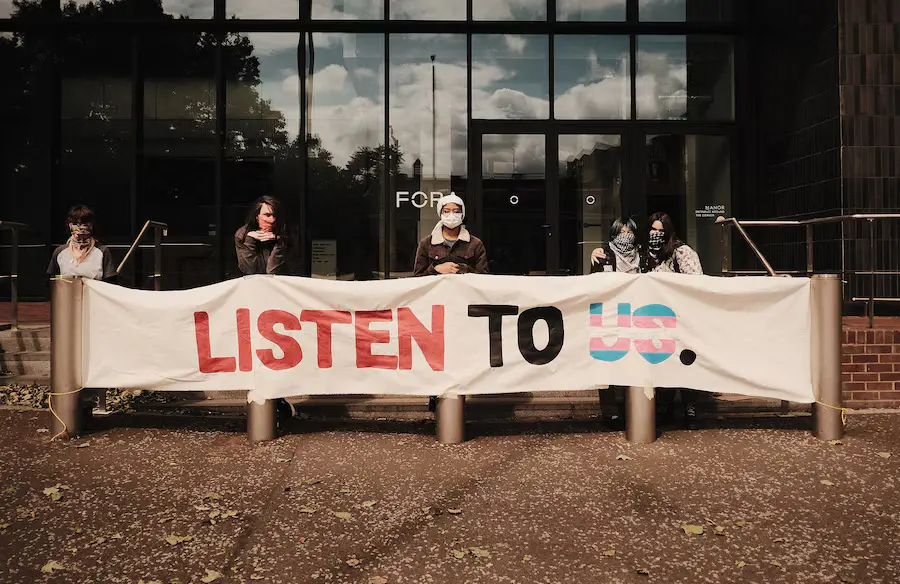

Trans Exile Network condemns the use of artificial intelligence in the Equality and Human Rights Commission’s (EHRC) handling of its consultation and the Commission’s rushed drive to publish new statutory guidance in the wake of the Supreme Court’s For Women Scotland ruling.
Within days of that ruling, the EHRC issued an “interim update” recasting day-to-day equality practice around biological definitions of sex and signalling more restrictive approaches to single-sex services and facilities. Although the EHRC acknowledged that services are not compelled to be single-sex in every case, its update warned that “mixed-sex only” provision could amount to indirect sex discrimination against women—guidance that has already prompted organisations to reassess toilets, changing spaces and wards through a narrow biological lens.
Today, The Times reports that the EHRC has now submitted its final guidance to ministers for approval following the Supreme Court’s decision redefining “sex” in the Equality Act as biological sex. We are deeply concerned that ministers could approve this guidance without full parliamentary scrutiny or a rights-based impact assessment on trans people’s daily access to services.
Last month, Trans Exile Network joined the Trans Advocacy and Complaints Collective (TACC) in formally withdrawing recognition of the Equality and Human Rights Commission (EHRC) as an independent and credible human rights institution following the appointment of Dr Mary-Ann Stephenson as Chair—her selection marking a troubling shift from impartial human-rights protection to political complicity in systemic exclusion of transgender and intersex communities. With the Commission’s guidance now before ministers for approval, this withdrawal is further vindicated and our concerns about process, legality, and harm are immediate and urgent.
The EHRC’s public consultation was initially set at just two weeks. An extraordinary departure from good practice before being extended to six weeks after pressure from parliamentarians and civil society. Even six weeks was criticized as inadequate for a Code that will be treated by courts as highly authoritative.
The Commission has publicly defended its use of “supervised AI technology” to process the 50,000+ responses. No matter the assurances, delegating triage of human rights evidence to automated systems risks bias, opacity, and the loss of nuance from communities most affected. This is especially troubling given the EHRC’s own warnings that AI can drive discrimination under equality and human rights law.
Since April, employers and service providers have been told to re-draw lines around who may enter women-only facilities, sports and wards by birth sex, creating uncertainty, distress, and fertile ground for harassment. Parliament’s own briefings confirm the ruling’s biological definition; meanwhile, commentary around the EHRC’s interim material has amplified the message that trans women can be excluded from women’s spaces and trans men from men’s spaces—even where alternative, dignified provision is absent.
While subsequent clarifications walked back some of the most sweeping claims about compulsory single-sex toilets, the harm is already being done: organisations are changing policies in ways that make everyday life harder and less safe for trans people. That chilling effect is the predictable consequence of rushing complex, sensitive guidance through a compressed process.
Due process: Guidance of this magnitude must not be nodded through by ministers. It warrants full parliamentary scrutiny, an Equality Impact Assessment, and publication of the EHRC’s methodology—including how AI systems were used to categorise and weigh evidence.
Human rights first: Any code must be read alongside the UK’s obligations under the Human Rights Act and the ECHR, with explicit safeguards to prevent discrimination, harassment and degrading treatment of trans people in public services and workplaces.
Apply the law correctly: sex segregation is legally optional. A business which chooses to have single sex facilities like toilets has to be able to show legally that it has a legitimate reason and that an absolutist sex-segregation is proportionate legally. That is a high standard to meet.
Transparency: The EHRC should publish the consultation analysis in full, including how AI tools were validated for bias and how human reviewers resolved contested classifications.